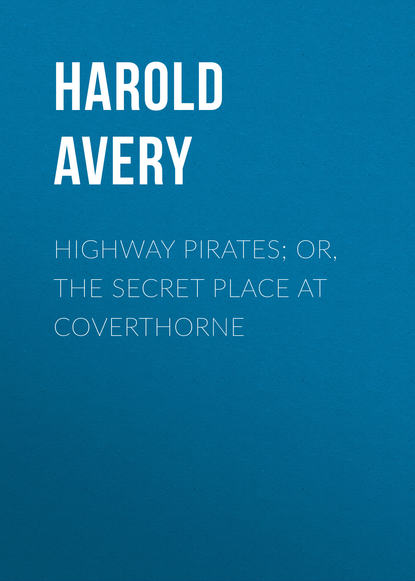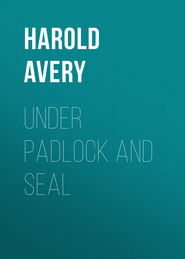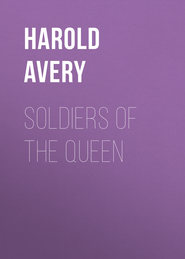По всем вопросам обращайтесь на: info@litportal.ru
(©) 2003-2024.
✖
Highway Pirates; or, The Secret Place at Coverthorne
Настройки чтения
Размер шрифта
Высота строк
Поля
"There, that's safer than letting it lie about on the ground. A chance kick might send it off, and one of us get the ball in his foot."
The set of the current seemed to have drifted more wreckage into the cavern, and the flowing tide had brought a quantity of it close to the extreme end of the cave, where it floated in a jumbled mass at the foot of our platform. By clambering down to the water's edge and "fishing" with another broken spar, we had no difficulty in drawing it towards us and then throwing it up to the rock above. One piece of timber which seemed a portion of a mast had a quantity of rope attached to it, and a couple of blocks with more cordage were also secured. At length my eye rested on another of those mischievous kegs, but this one apparently half or wholly empty, judging from the manner in which the greater portion of it appeared above the surface of the water.
"There's another of those little barrels," I said to George, half jestingly. "Haul it out, and we'll use it as our water-butt."
The keg was accordingly fished out of the sea, and added to our little pile of salvage. One or two more small fragments of wood were next recovered; then George pointed to a long, slender spar which I had already noticed, but which was floating close to the opposite wall of the cavern, and beyond our reach.
"That looks like an oar, Master Eden," he said. "We'll get that somehow. I think I can manage it with a line and slip-knot made out of some of that rope."
It did not take long for this simple tackle to be prepared, and with its aid George soon secured the oar, and handed it up to me as I stood above him on the rock. He passed it up, I say, blade first, and I remember, as I caught hold of it, having given a sudden cry, almost as though the wood had been red-hot iron.
"What's the matter?" shouted the astonished guard.
"O George, look here! – look at this!"
With a bound Woodley was at my side; but even then he could not guess the reason for my outcry. There was, after all, little for him to see – merely a letter "L" branded into the water-worn surface of the wood.
"What's the matter?" he asked.
"Matter!" I cried. "Don't you see that mark? This is one of the oars from Lewis's boat. O Woodley! can't you guess what's happened? She's capsized, and all those drunken rascals are drowned. I remember now there was a yell as they passed out of the cave, and then silence. I thought they'd gone beyond our hearing, but when they got into the swirl of the backwash at the foot of the cliffs they must have overturned. Lewis himself told me how dangerous it was. It would have been a difficult thing for a sober and experienced crew to get safely out to sea, but with the first bad lurch those madmen would have flung themselves about, and lost their balance in no time."
"It can't have been that," said George, who stood aghast at my suggestion. "Ten men drowned within fifty yards of us, and we none the wiser! No, no, Master Eden; I won't believe it."
"You forget they were all of them drunk," I answered. "Even if any of them had floated for a moment, we weren't likely to hear their stifled cries right back here, and above the noise the wash of the sea was making."
"How d'you know that oar came out of the boat? Its being marked with an 'L' is no proof that it belonged to Lewis."
"You forget I went out in his boat several times last summer, and learned to row. I remember the oar as well as if it was my own; it's got a smaller 'L' carved with a knife just below the button. There, see for yourself."
Still George stood staring at me as though unwilling to be convinced that the worst had happened.
"Look at that keg," I continued, "and see if it isn't the one they took with them in the boat. If so, you'll find the small hole they made with your knife."
On examination, the spot where the convicts had broached the anker was clearly visible. There could no longer be any doubt as to how it came to be floating on the water.
"Some of them must have got to land," muttered George doggedly.
"Not they!" I replied; "there wasn't a man of them could swim. Don't you remember what Rodwood said? I know Lewis couldn't, because he told us so last summer; and we remarked at the time how strange it was he had never learned, when he had spent most of his life on the water. Besides, what difference does it make to a man whether he can swim or not, if he's flung into the water stupefied with drink?"
The oar dropped from my hands as I spoke, and for some minutes each stood staring blankly in the other's face. That short space of silence did as much as an hour's feverish discussion of the subject to impress upon our minds how hazardous and almost hopeless our position had now become. No gloomy underground dungeon in some ancient prison, made secure by locks and bolts and watchful jailers, could have afforded less chance of escape than in our case did this cavern; for even if a boat had been waiting close outside, as neither of us could swim, there was enough deep water between us and the sunshine to drown us twenty times over. It was probable that even the smugglers only entered the cave on rare occasions, for too frequent visits would draw attention to the spot; and especially at this time of the year, close on Christmas, the chances were a thousand to one against any boat coming near the place till we had either died of starvation or been washed away in one of the fierce storms which raged constantly during the winter months. With the loss of the boat and its occupants all chance of communication with the outer world was ended; and if we had been marooned on an island or coral reef in the Pacific, far out of the usual track of ships, there could hardly have been less prospect of a timely rescue.
Though all these thoughts flashed through our minds, we neither of us seemed willing to put them into words; both shrank from being the first to pronounce the sentence of our doom. George Woodley at length broke the silence, and he did so in a voice the tone of which betrayed strong emotion.
"This is a bad lookout for us, Master Eden," he said. "What are we to do?"
"We must portion out the food," I answered, "and make it last as long as possible. There's the other pheasant, and the hare, two or three mince-pies, and a few apples, and part of the cheese. With that we ought to keep from starving a few days longer."
George shook his head, as if to imply that it would be only lengthening the agony of our suspense; and for a time we remained doing nothing but listlessly watching the sparkling patch of sea beyond the mouth of the cavern, in the vague hope that some boat would pass within hail. Owing to the fact that the entrance arch was low, and our platform was raised some distance above the water level, our view of the outside world was very limited, and unless a boat had come close in to the foot of the cliff we could not have seen her.
How long we remained thus in a state of hopeless inactivity I cannot tell. The hours of daylight seemed hardly less long and dragging than those of darkness. Woodley sat by the fire nursing his knees and sullenly chewing a splinter of wood. At last he roused himself and stood up.
"It's no good sitting here like this and not making a single bid for freedom!" he exclaimed. "A thought's just come into my head, and if you can't suggest anything better, why, I vote we try my plan."
"What is it?" I cried eagerly.
"Why, it's this," he answered. "We must at least try to get outside where folks can see us, and we can cry for help. Neither of us can swim, but here's wood, and rope to fasten it together. Why shouldn't we make a raft?"
The proposal was one exactly calculated to appeal to a boy's imagination; but when I cast my eyes over our stock of timber, the possibility of putting the project into actual execution seemed almost out of the question.
"There's never enough wood here for that!" I answered.
"There may not be sufficient to make a raft that would carry us both, but there ought to be enough to keep one of us afloat. Look here, sir," continued the man earnestly: "we've got to get out of this place somehow, and the sooner the better. If it means running risks, why, we shall have to run them. We're in peril of our lives as it is, standing here upon this rock. If it should come to blow really hard to-night, it would be good-bye to us before morning. My idea is this: – We must fasten enough of these logs together to make a raft big enough to carry me. That oar will serve as a paddle, or to shove off from the rocks, and so doing I ought, at all events, to be able to get outside into open water; and once out there I should be bound either to be seen or to drift ashore somewhere where I could climb the rocks. Then, you may be sure, it won't be long before I bring a boat round to rescue you."
"O George," I exclaimed, "I don't think I can stand being left quite alone in this awful place! Besides, what if you are washed off into the sea? You can't swim."
"I must take my chance of that, sir, as you must of being left," was the answer. "I'd suggest your going, only I think I'm the stronger, and could hold on longer if, as is sure to be the case, the waves wash over the logs. Think, sir, what'll happen in the first gale, even if our food lasts, and then take your choice."
I glanced round at the dark walls of our prison, which, though now high and dry, had been worn smooth by the storms of ages; and the very thought of the mountainous seas forcing their way in irresistible fury through the entrance of the cavern made me shudder. Take a bottle three parts full of water, I thought, and shake it violently from side to side, and that, on an infinitely larger scale, might be taken to represent what the interior of this cave would be like in a winter storm.
"Very well," I answered desperately. "If that's your plan, let's carry it out; I know of none better."
He turned at once, and worked with feverish eagerness, as though we knew that the dreaded storm was then brewing. Every piece of wreckage of any size which still remained within reach we fished out of the water and added to our store. The next business was to collect and untangle the rope and cord, and this took us far longer than we expected. The sodden knots wore the skin off the ends of our fingers, and made the job all the more laborious and painful. It was late in the afternoon before this portion of our task was accomplished. Then came selecting the most suitable pieces of timber, and planning how they should be arranged and joined together. All this while we kept glancing anxiously towards the entrance of the cave, still hoping against hope that some of the convicts might have escaped a watery grave, and either by capture or giving themselves up have made known our whereabouts to the good folks of Rockymouth. No help arrived, however, and it became more and more evident that none was to be expected. The patch of sea grew gray and misty as the second day of our captivity drew towards its close.
Kneeling in the quickly-gathering darkness of the cavern, George completed the first lashing of the logs; then gathering up all the remainder of the rope, that we might not entangle our feet, he stowed it away high up on the rocky ledge which had served as a shelf for our provisions.
All day we had hardly thought of food – a bite of cheese while we worked having proved sufficient; but now, though wearied with our labour, we set to work to pluck and cook the second pheasant – an operation which, as we sat in the darkness with no means of telling how time was passing, seemed to last far into the night. With most of our wood gone to form the raft, we had to be chary of our fuel. The bird was only half cooked, and I had little inclination for eating; but we forced ourselves to swallow something, for on George's strength keeping up, if not on mine, our last chance of rescue depended.
My cold was worse, and I felt utterly miserable as I sat crouching by the glowing embers, the warmth from which was not sufficient to temper the bitter breeze from the sea, which swept through the cavern as through a draughty tunnel.
"George," I said, "it would be awful to die here alone in the dark, and no one ever to know what had become of us. Are you sure that raft will carry you safely?"
"Oh, bless you, Master Eden, don't talk about dying," answered the man; "that's not the way the true Briton looks at things. 'Never say die' is his motto. There's many poor fellows been in worse plights than we are, and not thrown up the sponge. Bless you, sir, I shall help to carry you to and from school many a time yet, I hope. 'Woodley,' you'll say, 'this is better than the two nights we spent in that cave!' 'You're right, sir,' I shall answer; and then all the other outsides'll want to hear the story. Ho, ho! my eye! but I doubt if they'll believe it's all true!"
He went on cheering me with his lively talk, though his teeth chattered with the cold. He had never seemed more gay when perched on the back seat of the old Regulator. Yet if I could have read his thoughts, I might have discovered that he more than half believed that this was to be his last night on earth; for though determined for my sake, as well as for the wife and child dependent on him, to attempt an escape from the cave by means of the raft, he did not doubt that the chances were very much against his ever reaching the shore. So, for the sake of the youngster at his side, he hid his fears and made light of the uncertain future. Such was George Woodley, and as such I like to remember him: on the highroad a mail-coach guard, in the presence of death a very gallant gentleman.
The day had been tiring as well as anxious, and in spite of cold and discomforts my heavy eyelids began at length to droop and my head to nod, until before long my troubles were swallowed up in blissful forgetfulness.
I must have slept some hours, totally unconscious of what was going on around me. I have a distinct recollection that I was dreaming of making a journey by coach as an inside passenger. Mile by mile we went rumbling on; it was windy, for the blast came in gusts through the open windows, and roared in the tops of the wayside trees. We stopped to change horses, and as I looked out an hostler lifted a pail of water and, with a shout, flung it in my face!
I awoke gasping and choking. The water and the shout had been no dream, nor, for that matter, the unceasing sound which had seemed to me the noise of the wind and the lumbering vehicle. The next instant my arm was seized and shaken by Woodley.
"Rouse up, Master Eden!" he cried; "rouse up, sir! There's a storm coming on, and the sea is splashing over the rock!"
CHAPTER XV.
IN DESPERATE STRAITS
Dazed by the sudden alarm, I lay for a moment hardly knowing where I was; then another lash of icy cold water across my face brought me to my senses, and I sprang to my feet.







